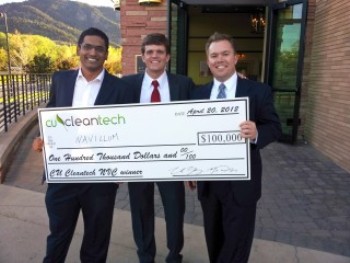Students at the University of Utah have won the first place in the regional CU Cleantech New Venture Challenge for their quantum dot technology. Quantum dots are tiny semiconductor nanocrystals that emit photons when excited.
 University of Utah Students have taken first place and a $100,000 prize with Quantum Dot Technology in the regional CU Cleantech New Venture Challenge. Quantum dots have wide-ranging applications for solar panels, televisions and cellphones. M.B.A. students from the David Eccles School of Business at the University of Utah pose with a $100,000 check they won at the CU Cleantech New Venture Challenge. Pictured are, left to right, Ameya Chaudhari, Chris Lewis and Ryan Tucker. (Photo courtesy of the University of Utah)
University of Utah Students have taken first place and a $100,000 prize with Quantum Dot Technology in the regional CU Cleantech New Venture Challenge. Quantum dots have wide-ranging applications for solar panels, televisions and cellphones. M.B.A. students from the David Eccles School of Business at the University of Utah pose with a $100,000 check they won at the CU Cleantech New Venture Challenge. Pictured are, left to right, Ameya Chaudhari, Chris Lewis and Ryan Tucker. (Photo courtesy of the University of Utah)
When compared to other materials, quantum dots require lesser energy for emitting light. The color of light emitted depends on the size of the quantum dots. Larger quantum dots produce light tending towards red color, while smaller dots produce light tending towards blue color. These manmade crystals hold potential for use in cellphones, televisions and solar panels.
Quantum dots cost $2,500 to $10,000 per gram and such high cost is a major deterrent. The cost is due to the expensive conventional processes that produce low yields and need high temperatures. Researchers at Utah may have a possible solution. They have formed a company, Navillum Nanotechnologies. Three M.B.A. students, Ryan Tucker, Ameya Chaudhari and Chris Lewis, from the David Eccles School of Business are assisting the project. At the regional CU Cleantech New Venture Challenge, the students won $100,000 and were placed first in the competition, which was financed by the U.S. Department of Energy. The business plan and the advanced technology helped the team win the prize. Navillum will make use of the prize money to improve and scale up their manufacturing process. When compared to conventional processes, the Navillum process produces less waste, while using lower temperatures.
The University of Utah, the Utah Science Technology and Research initiative and the Utah Governor’s Office of Economic Development have provided $155,000 in grants to Navillum. For winning the CU Cleantech New Venture Challenge, the company concentrated on energy efficiency and solar technology. Quantum dots have the ability to lower the energy requirement for TV and cellphone displays and can boost the solar energy captured by solar panels.